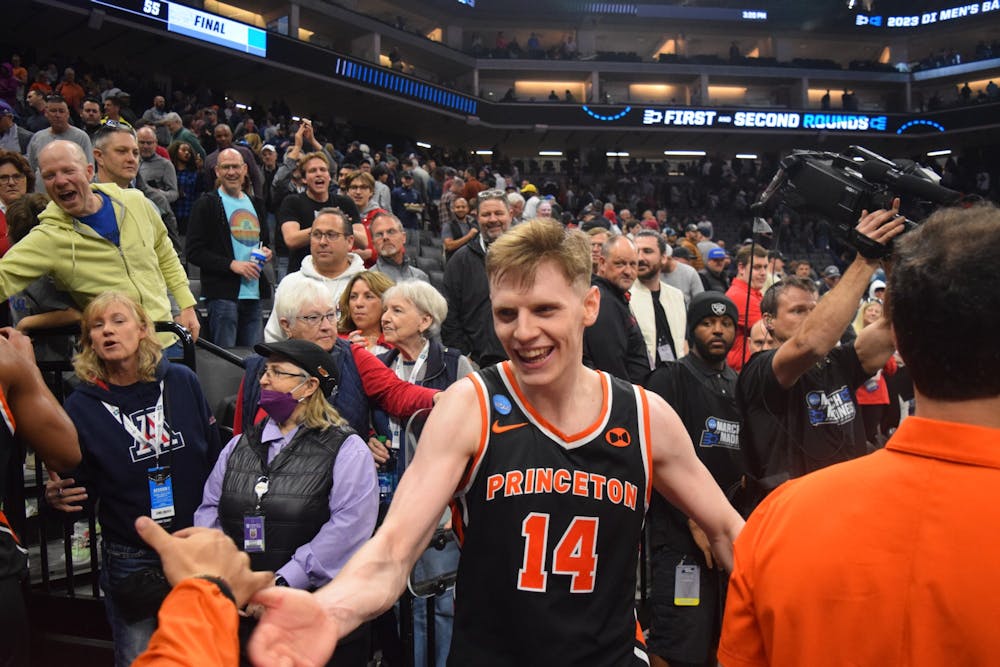SACRAMENTO, Calif. — The parallels are unavoidable and abundant.
A defensive battle. A Pac-12 champion. And most notably of all, Mitch Henderson ’98.
27 years after knocking off defending national champion UCLA in the first round of the NCAA Tournament, the head coach of Princeton men’s basketball — who was a sophomore guard on the 1996 Tigers team — is once again a tournament Cinderella. On Thursday afternoon, his 15th-seeded squad (22–8, 10–4 Ivy League) knocked off two-seed Arizona (28–7, 14–6 Pac-12), 59–55, giving the Princeton men their first March Madness victory in a quarter-century.
The Tigers’ last tournament triumph was in 1998, but the 1996 win — the final victory in the three-decade career of legendary Princeton head coach Pete Carril — holds a special significance in connection with Thursday’s upset, and not just because of Henderson’s involvement. Carril passed away last August, and the team has worn his signature bow-tie on their uniform this season in his memory.
“So much of what I say is [Carril’s],” Henderson said after the team won Ivy Madness last weekend. “A lot of this is honoring him.”
At the same time, though, Henderson seems intent on carving out his own path, both for himself and the teams he coaches.
“There's gonna be some comparisons from some of you, I'm sure, to coach Carril,” Henderson told the media after the win Thursday. “But I want to be really clear that this group did this, and that was a really long time ago.”
Indeed, in the nearly three-decades since the famous upset over UCLA, Princeton’s offensive style has changed tremendously. Gone are the days of careful cutting, draining the shot clock, and lulling opposing defenses to sleep. More so than during the Carril years, Henderson’s Tigers rely on their scoring and shotmaking, especially from the three-point line, to carry them to victory.
Yet, vestiges of the Carill era still remain. The offense, which was once run through facilitating big men like Kit Mueller ’91 and Steve Goodrich ‘98, now goes through the capable hands of senior forward Tosan Evbuomwan, who led the Ivy League this season in assists per game (5.2).
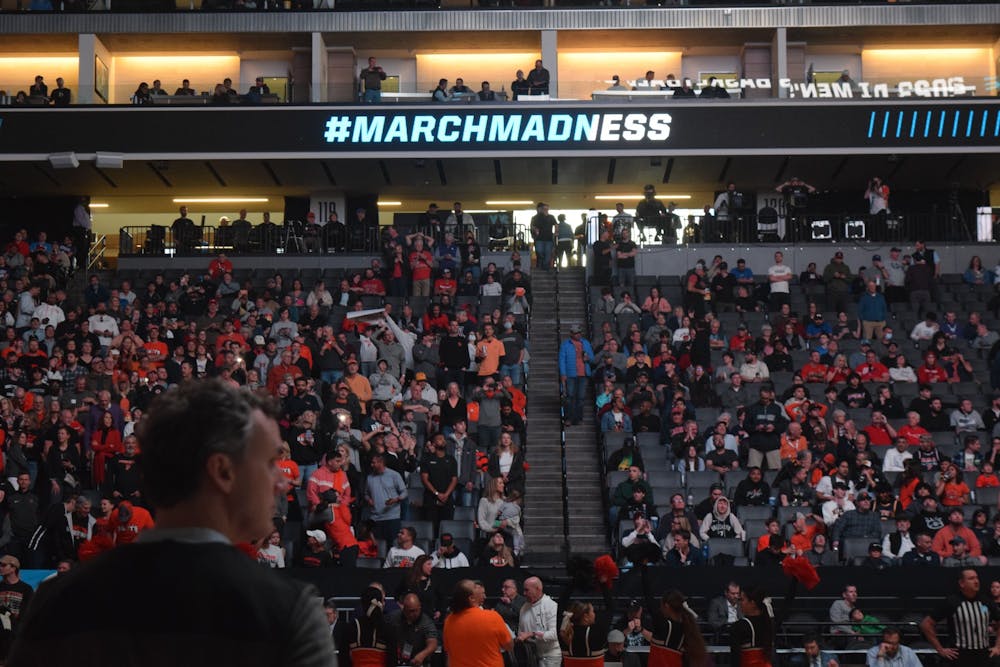
The Tigers had not won an NCAA Tournament game since 1998.
Wilson Conn / The Daily Princetonian
It must have been a concerning sight for Henderson, then, to see both his team’s shotmaking and Evbuomwan’s play falter early on against Arizona; the Tigers missed their first five three-point attempts, and the star forward came up empty on his first four field goal attempts, including a three-pointer that sailed past the rim for an airball.
According to Henderson, it was one last remnant of the Carril era which carried the Tigers through their shaky start, and ultimately to victory: their grit.

“That’s the through-line in the program for us, toughness,” Henderson said after the game. “Things that are tough, that are really hard to do … [we take] pride in those things.”
This tenacity was required for the Tigers right from the tip, especially when facing off against Arizona’s big men, Ąžuolas Tubelis (6’11”) and Oumar Ballo (7’0”). This season, the pair had combined for 34 points and 17.8 rebounds per game, on a team that, like Princeton, led its conference in rebounding. The Tigers’ game plan seemed to be to double-team the pair as often as possible to force them into turnovers or tough shots.
While both Tubelis and Ballo started off hot — scoring Arizona’s first 11 points, and 17 of their first 20 — it was the defensive effort of Evbuomwan, senior forward Keeshawn Kellman, and junior forward Zach Martini, among others, that kept the game from getting out of hand. Despite their massive size disadvantage — Kellman is the Tigers’ tallest player in the rotation at six feet, nine inches — the Tigers managed to emerge from the first half winning the rebounding battle, 21–17.
Martini led the Tigers in rebounding in the first half with five, finishing with seven boards and two steals.
“Zach Martini was unbelievable,” Henderson said. “He was all over the place.”
Martini came through on the offensive end, too, scoring a three-point shot to cut the early Arizona lead before scoring on a classic Princeton backdoor cut that sent the basketball historians (and the older alumni in attendance) into a frenzy.
The Pac-12 champions were no pushovers, though, and bounced back from Martini’s run to take a 31–22 lead. The upstart Tigers matched them, going on an 8–0 run to end the half within one point of the Wildcats.
Junior guard Matt Allocco and senior guard Ryan Langborg each had opportunities to give the Tigers the lead heading into the half, but Allocco’s buzzer-beating layup rimmed out. Even though the Tigers weren’t able to break into the lead before halftime, the mood in the locker room was extremely optimistic.
“‘You’re okay, we’re down one, get the crowd on your side, [and] have some fun,’” Henderson recalls saying to his team at the break. “It wasn’t anything earth-shattering.”
“It was loud in there; everybody had something to say, you know,” Allocco told members of the media after the game. “‘We’ve got this, stay in the moment; we're gonna make shots; we're gonna make big plays.’”
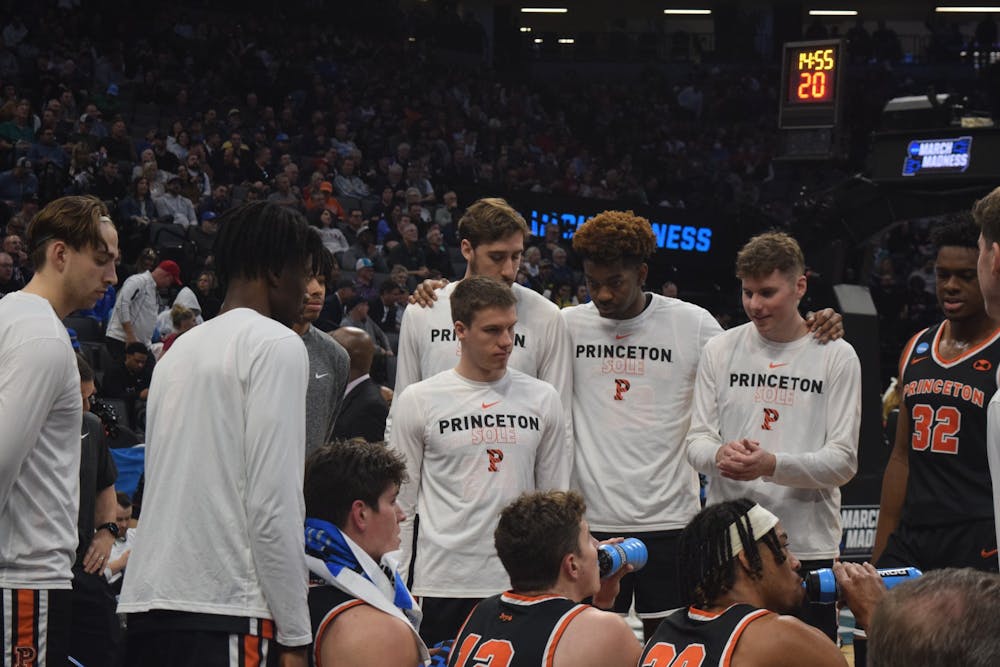
The Tigers beat Arizona in the rebounding battle, 38–37.
Wilson Conn / The Daily Princetonian
The numbers backed up the Tigers’ confidence, too. As mentioned, they were winning the rebounding battle, and had also managed to record just four first-half turnovers. The Tigers also allowed Arizona to shoot just 30 percent from three and under 45 percent from the field in the first half, while only giving up eight points to players not named Ballo or Tubelis.
“We want to win six games just like Arizona does,” Henderson said, referencing the number of victories required to capture a national championship. “And in order to do that, you've got to be tough defensively, because we did not shoot the ball very well tonight.”
“They didn't get transition baskets, for the most part,” he added. “We weren't perfect, but they weren't getting what they're really good at.”
However, as the second half began, the Tigers’ advantages began to wane. In the first seven minutes of the period, the Tigers turned the ball over six times. Arizona began to speed the pace of the game offensively and built a lead, which was once as large as 12 points.
Trailing and desperately needing a spark offensively, Princeton turned to sophomore guard Blake Peters. Peters, who has shot 37.6 percent from three this season while averaging just over 13 minutes per game, suddenly played a massive role for the Tigers, knocking down two key threes down the stretch to keep Princeton within striking distance.
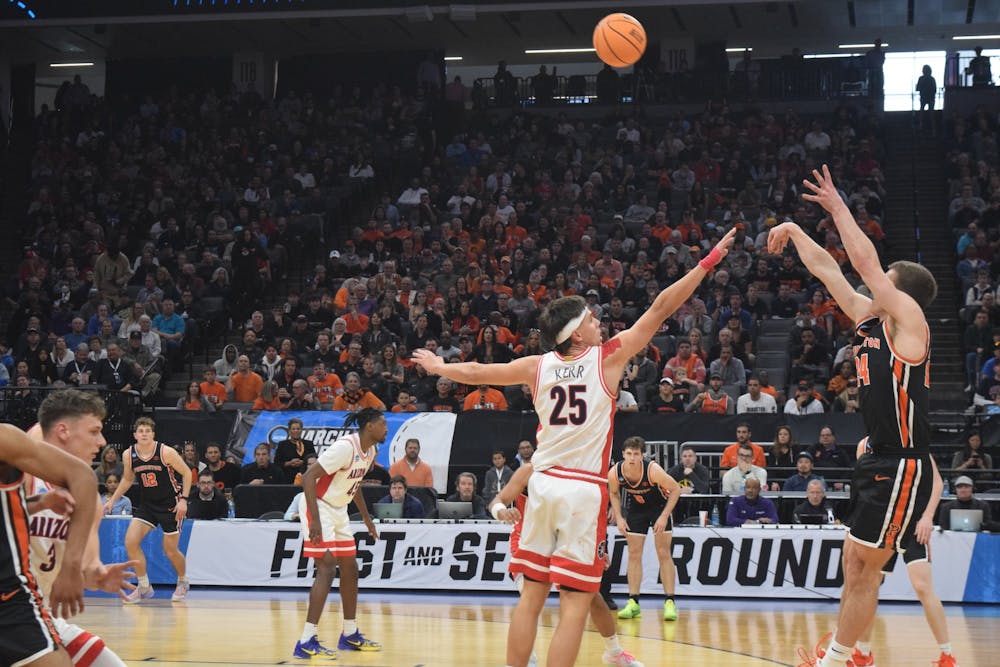
Sophomore guard Blake Peters shot 60 percent from deep. The rest of the team shot five percent.
Wilson Conn / The Daily Princetonian
Outside of Peters — who shot three-for-five from deep — the Tigers continued to struggle to get their shotmaking on track as the half progressed. They would finish having shot just four-for-25 from deep, and just 40.6 percent from the floor overall.
Once again, though, it was the Tigers’ defense that came through. Kellman, Evbuomwan, and first-year forward Caden Pierce worked hard to defend the Wildcat bigs, coming up with key blocks and rebound after rebound. In the final eight minutes of play, the Tigers gave up just four points — and zero in the last 4:45 — a nearly unfathomable result against a team that averaged over 80 points per game entering Thursday’s contest.
“It’s such a tough group,” Henderson said. “We’re imperfect, but we’re a very tough group.”
As the defense held, the Tigers continued to search for a shot that would put them in the lead. As was the case at the end of the first half, the Tigers struggled to find a way through, with both Langborg and Pierce missing open three-pointers.
“We talk confidently,” Henderson said. “We felt we could win, [and] with four minutes left, [we said] ‘we're gonna win this game.’”
Langborg finally found the bottom of the net on a foul-line jumper to cut the Arizona lead to one at 55–54, before scoring a layup to give the Tigers their first lead of the game with just over two minutes remaining. The Californian was a hero on the defensive end, too, blocking Arizona guard Courtney Ramey with just 50 seconds remaining.
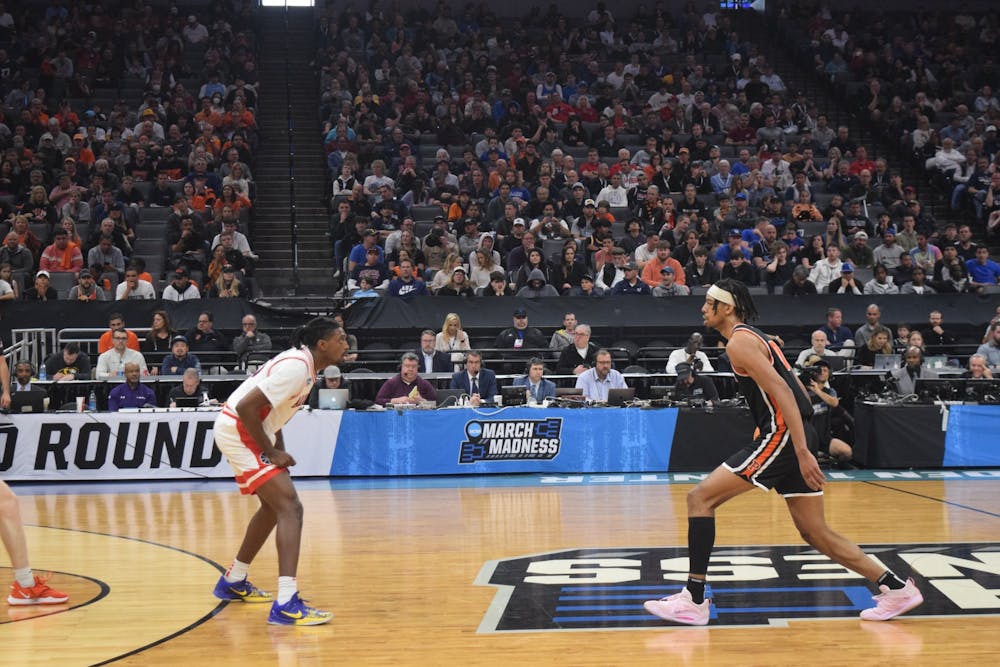
The Tigers will face Missouri on Saturday in the Second Round.
Wilson Conn / The Daily Princetonian
After Caden Pierce hit a pair of free throws, Arizona had one last chance to tie the game, now trailing by three. At that point, it seemed the Tigers were ready to cash in on a bit of March Madness underdog luck.
“They had three shots at the basket from 21 seconds [left],” Henderson said. “Those usually go in in a game like this ... We got lucky.”
With the win, the Tigers became just the 11th 15-seed to win an NCAA Tournament game, and the third in the last three seasons, following in the footsteps of fellow New-Jerseyans Saint Peter’s, who made it all the way to the Elite Eight as a 15-seed last season. They are the lowest-seeded Ivy League team to ever win a March Madness game.
“To beat a great team like that on this stage is a pretty special feeling, but also, I can't say I'm surprised,” Allocco said. “This team has been so good all year.”
“On paper, it's going to look like a big upset,” he continued. “But we believe in each other and we think we're a really good team. When we're at our best, I think we can beat anybody in the country.”
The Tigers will now continue their tournament journey against seventh-seeded Missouri (25–9, 11–7 Southeastern) on Saturday. Even with the short turnaround, Henderson is confident the Tigers can keep their run going.
“We played the majority of our games in our league on back-to-backs,” he said. “So the [extra] day of preparation is quite nice.”
“Missouri is really good, [and] we’re playing great,” he added. “It’ll be a fun challenge.”
Wilson Conn is a head editor for the Sports section at the 'Prince.' Please direct any corrections requests to corrections[at]dailyprincetonian.com.





